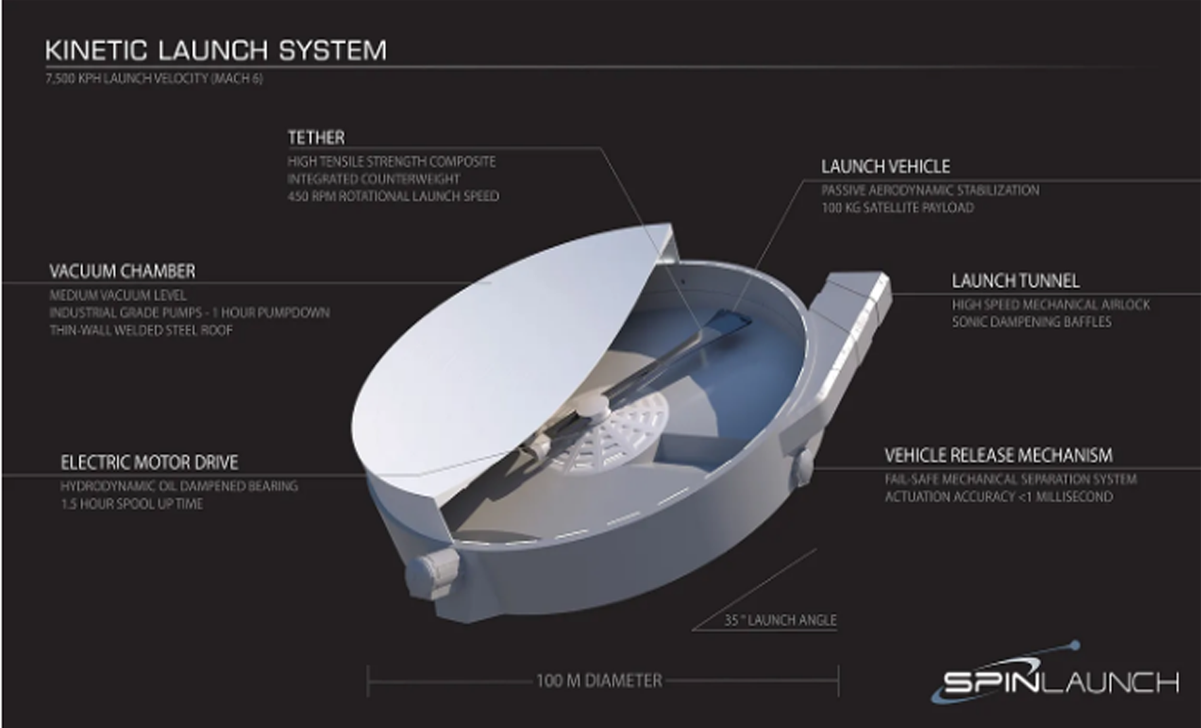Low Earth Orbit Tech: Giant Catapult Sends Satellites Into Space Without Using Rocket Fuel
SpinLaunch, a California-based company, is revolutionizing satellite launches with a kinetic launch system that eliminates the need for rocket fuel. Using a giant rotating arm powered by electricity, it can send payloads into orbit at high speeds, reducing costs and environmental impact. The technology, inspired by medieval siege engines, has already completed successful test flights. If scalable, SpinLaunch’s system could transform space transportation by offering a sustainable and efficient alternative to traditional rockets.
Summary
- SpinLaunch’s Kinetic Launch System: Employs a massive rotating arm powered by electricity to hurl satellites into space, eliminating the need for rocket fuel.
- Environmental and Cost Benefits: This method reduces both the financial costs and environmental impacts associated with traditional rocket launches.
- Successful Test Flights: The company has completed multiple successful test flights, demonstrating the viability of their technology.
- Historical Inspiration: The concept draws from ancient siege engines like trebuchets, which used kinetic energy to launch projectiles.
- Modern Materials and Electronics: Advancements in carbon fiber and miniaturized electronics are crucial to the system’s success.
- Collaborations and Funding: SpinLaunch has secured significant funding and partnerships with organizations such as NASA and Airbus.
- Future Plans: The company aims to deploy satellite constellations into orbits below 600 miles by 2026.
𝐒𝐚𝐭𝐞𝐥𝐥𝐢𝐭𝐞 𝐋𝐚𝐮𝐧𝐜𝐡𝐢𝐧𝐠 𝐖𝐢𝐭𝐡𝐨𝐮𝐭 𝐑𝐨𝐜𝐤𝐞𝐭 𝐅𝐮𝐞𝐥
SpinLaunch is challenging the long-standing reliance on chemical rockets by developing a kinetic launch system. Instead of burning massive amounts of fuel, the system uses a large vacuum-sealed centrifuge to accelerate satellites and other payloads before hurling them into the upper atmosphere.
The principle behind this approach is not new—medieval trebuchets used similar kinetic energy concepts to launch projectiles. However, modern materials, electronics, and engineering advancements have made it possible to scale this method for space launches.
𝐇𝐨𝐰 𝐒𝐩𝐢𝐧𝐋𝐚𝐮𝐧𝐜𝐡 𝐖𝐨𝐫𝐤𝐬
SpinLaunch’s orbital accelerator is essentially a massive, high-speed spinning arm enclosed in a vacuum chamber. Here’s how it functions:
- A payload (satellite or spacecraft) is attached to the rotating arm inside the chamber.
- The system spins the payload at incredible speeds (up to 5000 mph) using electric motors.
- At the precise moment, the arm releases the payload, flinging it into space.
Unlike rockets, this system does not require staging, meaning there are no parts to be discarded mid-flight.
𝐀𝐝𝐯𝐚𝐧𝐭𝐚𝐠𝐞𝐬 𝐎𝐟 𝐊𝐢𝐧𝐞𝐭𝐢𝐜 𝐋𝐚𝐮𝐧𝐜𝐡𝐞𝐬
- Lower cost: Fuel is one of the largest expenses in traditional rocket launches. SpinLaunch eliminates this entirely.
- Eco-friendly: No carbon emissions or fuel combustion reduces environmental damage.
- High launch frequency: The system can launch satellites multiple times a day without requiring extensive refurbishment.
𝐂𝐡𝐚𝐥𝐥𝐞𝐧𝐠𝐞𝐬 𝐅𝐨𝐫 𝐒𝐩𝐢𝐧𝐋𝐚𝐮𝐧𝐜𝐡
While the idea is promising, several technical hurdles remain:
- Extreme G-forces: The payload must withstand forces of up to 10,000 Gs, requiring special engineering.
- Atmospheric resistance: The object must pierce through the lower atmosphere at high speeds.
- Payload limitations: Currently, only small satellites can be launched, as the system is not designed for human travel.

𝐎𝐭𝐡𝐞𝐫 𝐈𝐧𝐧𝐨𝐯𝐚𝐭𝐢𝐯𝐞 𝐋𝐚𝐮𝐧𝐜𝐡 𝐌𝐞𝐭𝐡𝐨𝐝𝐬
SpinLaunch is not the only company reimagining space travel. Other exciting satellite launch alternatives include:
| Technology | Developer | Key Benefit |
|---|---|---|
| Reusable Rockets | SpaceX | Reduces costs by landing and reusing boosters |
| Air-Launched Rockets | Virgin Orbit | Flexible launch locations |
| 3D-Printed Rockets | Relativity Space | Faster, cheaper manufacturing |
| Space Tugs | Momentus | Moves satellites after launch |
Each of these alternative launch methods contributes to making space more accessible, reducing dependence on traditional rocket launches.
𝐓𝐡𝐞 𝐅𝐮𝐭𝐮𝐫𝐞 𝐎𝐟 𝐒𝐩𝐢𝐧𝐋𝐚𝐮𝐧𝐜𝐡
SpinLaunch has already completed multiple successful test flights and is now working toward building a coastal launch facility for orbital launches.
Their next steps include:
- Developing a larger system to support heavier payloads.
- Partnering with organizations like NASA, Airbus, and Cornell University.
- Expanding their system to be a primary method of small satellite deployment.
If successful, kinetic launch technology could redefine the economics of space travel.
𝐅𝐚𝐜𝐭𝐬 𝐀𝐛𝐨𝐮𝐭 𝐊𝐢𝐧𝐞𝐭𝐢𝐜 𝐋𝐚𝐮𝐧𝐜𝐡
- SpinLaunch’s system is 10 times more energy efficient than chemical rockets.
- NASA’s cannon-launched projectiles inspired parts of this design.
- The launch speed is faster than a bullet! SpinLaunch hurls objects at Mach 6 speeds.
- Ancient war machines like trebuchets used similar physics.
𝐑𝐞𝐟𝐞𝐫𝐞𝐧𝐜𝐞𝐬
- SpinLaunch Official Website
- Equatorial Space Systems
- Blue Origin New Shepard
- Rocket Lab Electron
- Virgin Orbit LauncherOne
- Sierra Nevada Dream Chaser
- Relativity Space Terran R
- SpaceX Starship
- OneWeb Satellite System
- Momentus Space Tugs
- Virgin Galactic Hybrid Rocket